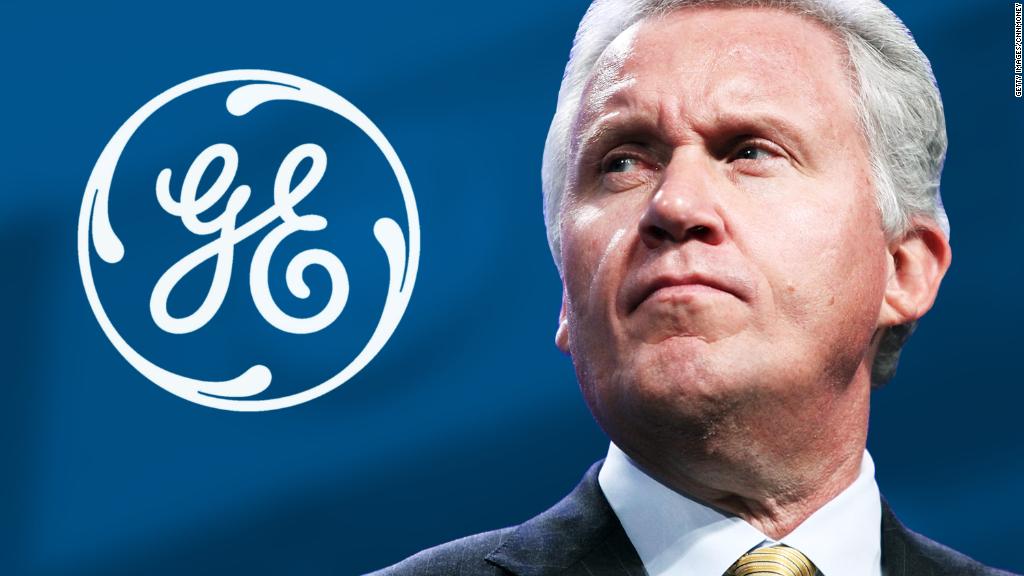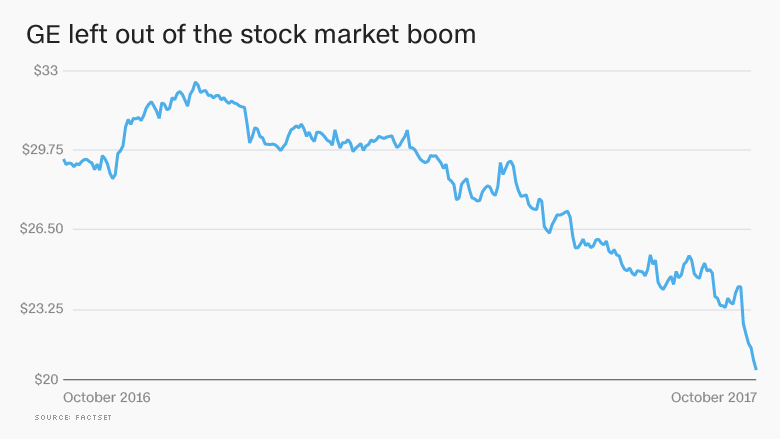
General Electric has spent a decade dismantling its empire. Now it's about to get even smaller.
GE has already jettisoned its gigantic real estate portfolio, its dishwasher and appliance business, and legendary media properties NBC and Universal Studios. More recently, it unloaded its water business and a unit that makes electrical equipment for utilities. Even the light bulb division is up for sale.
All this is part of GE's mission to focus on being a modern industrial company that sells things like jet engines, power plants and MRI machines.
Now GE (GE) is planning to shrink itself further because of mounting financial troubles that have crushed the stock and led to fears that it will cut its coveted dividend for only the second time since the Great Depression.
GE recently revealed plans to get rid of businesses worth at least $20 billion in the next year or two. One unit that could be on the chopping block is its struggling railroad business, which GE has owned for more than a century.
Yet another round of downsizing shows just how desperately the company needs the cash.
"GE is in a cash crunch," said John Inch, a Deutsche Bank analyst who covers GE and has a "sell" rating on the stock. "They are not generating enough cash flow this year to pay the dividend. That's a problem."

Given the scale of GE's problems, some analysts are predicting that its new management team could be even more aggressive in trying to unload businesses.
"We would imagine something much bigger once the dust settles," Scott Davis, CEO and lead analyst at Melius Research, wrote in a recent report. He added that GE will likely sell anything that "isn't nailed down."
GE's workforce has also shrunk in recent years -- and analysts expect the company may announce layoffs soon. GE employed about 295,000 people at the end of last year. That's down from about 333,000 at the end of 2015.
Related: GE's nightmare just got worse
GE is scrambling to ease serious concern on Wall Street about the company and its beloved dividend. GE's stock has plunged 35% this year, making the iconic company the worst performer on the Dow by a long shot. (The next closest is Verizon (VZ), down 8%.)
Earlier this month, GE reported dreadful results that new CEO John Flannery called "completely unacceptable." Last week, GE stock tumbled nearly 13%, its worst week since January 2009. And that was during the financial crisis, a time when investors fled GE because they worried about its massive financial arm, known as GE Capital.
GE has since unwound most of GE Capital, selling off at least $150 billion of assets. That included GE Capital's real estate business, most of which was acquired by Blackstone (BX) and Wells Fargo (WFC).
Last year, GE also merged its oil and gas business with Baker Hughes (BHGE). The combined company is majority-owned by GE and trades separately on the New York Stock Exchange.
GE did make one recent takeover splash: In 2015, it completed the acquisition of Alstom's power and grid businesses. It was GE's biggest-ever industrial purchase.
Related: Could GE get booted from the Dow after 110 years?
Still, Flannery believes GE is too complex. While GE has a "number of strong franchises," Flannery said during a recent conference call that other businesses "drain investment and management resources without the prospect for a substantial reward."
Unlike companies that make simple products like clothing, GE's jet engines, locomotives and power plant systems require expensive engineering, factories, equipment and manpower to create. That makes it difficult to be nimble during downturns, such as the one facing GE's power business.
"When markets turn down, you can get caught," said Inch.
Another business getting hit hard is the railroad unit. GE is planning to get out of the railroad business through a potential sale or spinoff, The Wall Street Journal reported last week. GE could also unload part or all of its healthcare IT business, the paper reported.
GE declined to comment on "rumor or speculation."
It's too early to tell whether GE's plans to sell off assets will do enough to ease worries on Wall Street about the company's future.
"This is going to take a very long time to fix," Inch said. "They have a crisis of investor confidence."


